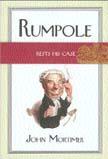
Many critics and readers have hailed Rumpole Rests His Case as a fine end to a superb series, but author John Mortimer has taken pains to note that he’s not necessarily finished with the old barrister yet. For those of you who haven’t been introduced to this wonderful series, it’s the continuing saga of a brilliant but unappreciated British criminal lawyer, Horace Rumpole, whose motto is “Never plead guilty!”
Rumpole (too many people think it’s two words, with an “h” in the middle; don’t make the same mistake) is one of the few lawyers in England with (almost) unshakable moral principles.
While less talented and less reputable lawyers earn huge fees and accolades for their work, Rumpole takes home minimal wages despite stellar performances because he refuses to play the British legal politics game, which rewards lawyers who went to the right schools and licked the right boots.
He’s an irreverent, rather Chestertonian figure in a shabby wig and gown, who quotes poetry as he solves the crimes.
Unlike Erle Stanley Gardner’s Perry Mason, Rumpole doesn’t always win. And like Agatha Christie’s Sir Wilfred Robarts, Rumpole knows that the verdict doesn’t necessarily reflect the truth of the case.
Rumpole is married to the formidable grande dame Hilda, known to him only as She Who Must Be Obeyed (just one of the many literary references you’ll find in Rumpole books).
Hilda’s numerous friends and relations frequently call on Rumpole for help, and Hilda has even been known to solve a case or two of her own. The rest of the recurring cast are members of the legal system.
Sam Ballard, the pretentiously pious Head of Chambers, is Rumpole’s foil. Liz Probert, the uber-feminist and social critic, both idolizes Rumpole for his talents and chastises him for his politics.
Claude Erksine-Brown, the doddering opera lover who’s even worse at having affairs than he is at law, often relies on Rumpole to save his marriage.
Ferdinand Issac Gerald (“Fig”) Newton is the unstoppable private eye. Judge Bullingham is the bloodthirsty magistrate who believes that all defendants are guilty; otherwise they wouldn’t be where they are. He has never forgiven the British Parliament for banning capital punishment.
All of these characters are vital to the appeal of the Rumpole series, and by this book even the least palatable of them seem like old friends.
It is essential, when reading these books, to realize that the British legal system is different from the American one in many ways. British hierarchies, positions, and terminologies are so confusing to the novice Rumpole reader that a quick course in British Law 101 is mandatory.
I have purposely left out many explanations and definitions from the British legal system because to include them would add several pages to this review, but one should learn some major points before reading. For details, check out the unofficial Rumpole Home Page at http://www.cs.umbc.edu/schott/rumpole/.
To reveal too much about the short stories would spoil the surprises, but some of the plots involve a virulent defender of Civilization As We Know It who’s arrested on a marijuana possession charge, a teenager charged with stalking an old friend, a two-decades-old murder, and a struggle to save Afghani refugees.
Rumpole always discovers the truth, although he frequently can’t prove it to the rest of the world.
The last story would be a perfect ending for the series, but there’s absolutely nothing in the ending to prevent Mortimer from writing another book.
You can begin the series at any point; there are about 10 collections of short stories and one novel by now. All are of superb quality, although Mortimer’s writing becomes increasingly assured as time goes on.
Also not to be missed are the television adaptations, also penned by Mortimer and starring the late, great Leo McKern. Just one episode of this series is better than the combined runs of every legal drama on television today, with the big exception of Law & Order.
Rumpole Rests His Case is a solid addition to one of the best mystery series ever.
